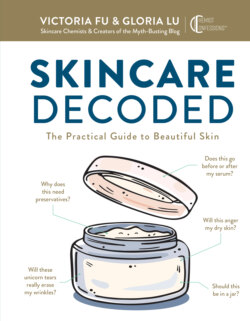Читать книгу Skincare Decoded - Victoria Fu - Страница 18
На сайте Литреса книга снята с продажи.
ОглавлениеSKINCARE DECODED • 20 BASICS 101 • 21
Normal Skin (scientific term: . . . skin)
There’s a lucky subset of you who have skin that seems just fine: normal, healthy,
and hydrated. Skin is bouncy, your skin tone is bright, and you’re neither flaky
nor oily, because you’ve got that coveted optimal water concentration in the
stratum corneum. Lucky you—carry on! That doesn’t mean you won’t experience
unwanted skin changes here and there when life throws new challenges your way.
But you already have a fantastic starting baseline! (Jump to our age-prevention
recommendations on page 204 to keep your skin the subject of envy for life.)
Oily Skin (scientific term: seborrhea)
The light shines just right, and you can’t help but feel like you’re a disco grease ball?
Oily skin is characterized by excess sebum, or oil, production due to enlarged seba-
ceous glands. Sebum is produced by the sebaceous glands connected to your hair
follicles. This is why acne is often linked to oily skin types. Men tend to have oily skin
due to higher levels of testosterone.
Although you may find excess sebum production kind of gross, sebum
actually plays an important part in overall skin health and immunity. Via
sebum, the skin is able to produce fat-soluble antioxidants and provide an
antimicrobial layer. Another misconception is that having oily skin means that
you don’t have to use moisturizers. While it’s true that sebum can indirectly
help SC hydration, sebum production and skin hydration are actually
independent of one another. That’s because sebum production doesn’t involve
the lipid matrix, which prevents water evaporation, it involves the sebaceous
glands found in the hair follicle. (Refer to the skin diagram to help visualize the
difference between the sebum gland and the lipid matrix.) Thus, more sebum
output doesn’t entirely correlate to a higher ability for the SC to retain water in
the skin. Short version? Oily skin can still be dehydrated.
Key Traits
Characteristics Excess sebum, acne, blackhead congestion, large pores, shiny
skin by late afternoon, and a general feeling of wanting to wash your face too
many times.
